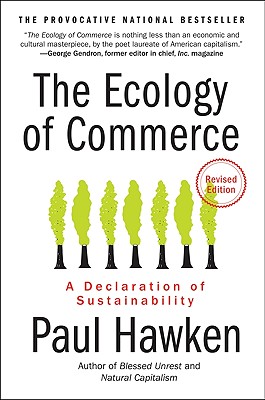 |
Home |
Catalogs |
Contact Us |

Books on:
Animal RightsBlack History
Clean Energy
Democracy
Eco Design
Eco History
Food and Nutrition
Genetic Engineering
Green Cities
Green Politics
Local Economics
Natural Building
Peace and Nonviolence
Simple Living
Trees and Forests
 |
The Ecology of Commerce
A Declaration of Sustainability
by Paul Hawken
HarperBusiness, Rev. Ed., 2010
Purchase
on Amazon.com
The Ecology of Commerce outlines the environmentally destructive aspects of many current business practices, and offers the vision of businesses adopting new practices to promote environmental restoration.
Praise for The Ecology of Commerce
"Its sheer volume of new ideas coupled with Hawken's elegant style of disclosure makes almost all business books pale beside it. The tonnage of new publications on environmental degradation and what to do about it reflects increasing concern, but rarely has that concern been so productively expressed."-- Michael Pellecchia, Dallas Morning News
"The Ecology of Commerce is nothing less than an economic and cultural masterpiece, by the poet laureate of American capitalism."--George Gendron, Editor-in-Chief, Inc.
"This is, in my view, the first extensive, truly ecological analysis of business; deeply disturbing and yet full of hope. Essential reading for all who care about our planet."--Fritjof Capra
"Environmentalists usually assume business is the enemy and vice versa. If Hawken is right, and he's got a good track record, the environmental perspective is the only way business will prosper, and business may be the only way to achieve a healthy planet. This goes beyond the revolutionary to the essential. Must reading for eco freaks and pinstripes, and anyone else who cares about living."--Amory and L. Hunter Lovins, Rocky Mountain Institute
National Bestseller
Quotes from The Ecology of Commerce
"The dirty secret in environmentalism is that there is no such thing as sustainability. Habitats can endure over millennia, but it's practically impossible to calculate the sustainability of specific fisheries, tracts of land, and actual forests. We have also probably already passed the point where present planetary resources can be relied on to support the population of the next forty years. Any viable economic program must turn back the resource clock and devote itself actively to restoring damaged and deteriorating systems--restoration is far more compelling than the algebra of sustainability."
"Why, then, do we accept the excuses? Why do we hand business a blank check and exempt enterprise from the responsibility for maintaining social values? One reason might be that . . . we have only a piecemeal view of events. We have no [way to] accumulate the overall image of cumulative destruction. Furthermore, their actions are defended--I daresay have to be defended--because most of us are dependent upon them for our livelihood. Even a declining General Motors still employs nearly 600,000 people. A supermarket chain such as American Stores employs 200,000 or more. The 400 companies profiled in Everybody's Business Almanac employ or support one-fourth of the U.S. population. . . . The average large business is 16,500 times larger than the average small business. And since much of the population is now employed by these large corporations, they naturally see their interest as being linked to the success and growth of their employers. Such fealty resembles the allegiance that sustained feudal baronies; the vassal serfs believed that the lord who exploited them was better than the uncertainty of no lord at all. But in the competitive world of modern commerce, loyalty to the system prevents an objective examination of how market capitalism can also work against those who serve it."
"We should not be surprised then, that there is deep-seated unwillingness to face the necessary reconstruction of our commercial institutions so that they function on behalf of our lives. Business believes that if it does not continue to grow and instead cuts back and retreats, it will destroy itself. Ecologists believe that if business continues its unabated expansion it will destroy the world around it. This book will discuss a third way, a path that restores the natural communities on earth but uses many of the historically effective organizational and market techniques of free enterprise."
"The cumulative impact of corporate crime is a deep-seated, 'free-floating' cynicism and distrust regarding big business. If we are to create a commercial culture that does no harm to natural and human communities, society will have to define commercial crime more effectively, and begin to see it as something less than inevitable, and more than excusable."
"What misleads citizens in the richer nations is that we in the industrialized North are very well provided for indeed: with some notable exceptions, we either don't see, don't experience, or choose to ignore the impact our lives have. It is difficult for us to imagine that the ecological principle of carrying capacity can significantly affect us. Between the advertisements for Eddie Bauer, Jeeps, the suburbs, and the mall, we assume that we're not taking too much from our environment, or we would see more signs of stress and deterioration around us. Our comfort and abundance is the foundation for the great differences we see in public debate and private discussions about the environment. . . . We confuse our rate and ability to consume with the capacity of living systems to provide for those wants."
"Those who argue that we need to grow our way out of ecological problems do not acknowledge a profound and troubling contradiction: If the population of China lived as well as the population of Japan or France or the United Stated, we would endure untold ecological devastation. Even as we invoke economic pieties to justify multinational expansion and 'freer' trade policies, the actual result of helping the world raise itself by its bootstraps has been the opposite: By 1990, the lowest quintile in the world income had become twice as poor when compared to the top quintile than it was in 1960. The benefits of global expansion are highly concentrated in the northern countries, and in the hands of corporations and their owners. . . you cannot grow out of a problem if it is embedded in the thing that is growing, or as the Somalians say, you cannot wake up a man who is pretending to be asleep."
"We may have already surpassed the point at which we can sustainably support the world's population using present standards of production and consumption. That disturbing possibility should impel us to seek, as sensibly and quickly as possible, an integration of our wants and needs as expressed and served by commerce, with the capacity of the earth, water, forests, and fields to meet them. Thus, this book proposes three approaches, all guided by the example of nature. The first is to obey the waste-equals-food principle and entirely eliminate waste from our industrial production. . . . The second principle is to change from an economy based on carbon to one based on hydrogen and sunshine. . . . Third , we must create systems of feedback and accountability that support and strengthen restorative behavior, whether they are in resource utilities, green fees on agricultural chemicals, or reliance on local production and distribution. . . . All three recommendations have a single purpose: to reduce substantially the impact that each of us has upon our environment. . . . We have to be able to imagine a life where having less is truly more satisfying, more interesting, and of course, more secure."
Table of Contents of The Ecology of Commerce
- A Teasing Irony
- The Death of Birth
- The Creation of Waste
- Parking Lots and Potato Heads
- Pigou's Solution
- The Size Thing
- Private Lives and Corporate Rights
- When an Ethic is Not an Ethic
- The Opportunity of Insignificance
- Restoring the Guardian
- Pink Salmon and Green Fees
- The Inestimable Gift of a Future
Reader Reviews of The Ecology of Commerce
G. Nelson, Dr. Andrew Larkin's economics class, St. Cloud State University, MN , May 1997
Mr. Hawken, I just wanted to tell you how much I have enjoyed reading your book, The Ecology of Commerce. I like to think of myself as environmentally aware of industrial pollution, but you have opened my eyes to the real problem of economic degradation of our environment. I think your solutions for a restoractive economy are nothing short of brilliant. You have given us who care some hope that there can be a better tomorrow in the plutocracy we live in. Thank you very much.
Luke S. Harding, Charlton, NY, April 1997
As a recent graduate of Cornell University's Department of Natural Resources, I had contemplated the pursuit of an advanced degree in a research science, such as ornithology, but I was concerned for the plight of our environment and society and felt that I needed to somehow make a dramatic contribution to the fight to save our resources and our culture. I read Hawken's book after graduating (I got it for a dollar at Cornell's bookstore), and now I know what I want to do. I am applying for a master's in environmental/ ecological economics in the fall of 1998, and I cannot wait to use my passion for the environment in a field that will have direct impacts on the state of our natural and business worlds. Thank you for selling such an important literary work.
Reader Comments |
